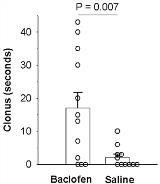POSTICTAL GABA[sub]B[/sub] RECEPTOR ACTIVATION WORSENS SUBSEQUENT SEIZURES
Abstract number :
1.013
Submission category :
Year :
2004
Submission ID :
4114
Source :
www.aesnet.org
Presentation date :
12/2/2004 12:00:00 AM
Published date :
Dec 1, 2004, 06:00 AM
Authors :
Miles S. Evans, Doris J. Casebeer, and Dean K. Naritoku
The GABAB receptor agonist baclofen is used clinically for spasticity. Acutely, it causes neuronal inhibition through postsynaptic hyperpolarization and presynaptic inhibition of neurotransmitter release. Baclofen acutely inhibits seizures in animal models, but is not useful as an antiepileptic in humans. Baclofen withdrawal in humans can have marked proconvulsant actions, through unknown mechanisms that do not involve GABAB receptor transcription or translation (Lehmann et al. 2002 Neurochem. Res. 28:387-393). To further investigate baclofen[apos]s proconvulsant actions, we studied the effects of baclofen on audiogenic seizures (AGS) in genetically epilepsy-prone rats (GEPR). In one experiment, baclofen (6 mg/kg intraperitoneal) or saline was injected immediately after AGS in GEPR (GEPR-9, severe-seizure strain). After one AGS and injection, the effect on an AGS one day later was assessed. AGS were recorded on videotape, and AGS score, latency to onset, and duration of wild running, tonus, and post-tonic clonus were measured. In a second experiment, 12 daily repeated AGS with injection of baclofen or vehicle, were given. In a third experiment, baclofen or vehicle alone was given daily for 1 or 3 days, without seizures, and the effect on the animal[apos]s first seizure was assessed 24 hours after the last dose. The duration of a second seizure elicited 24 hours later was markedly longer if baclofen was given immediately after the first seizure. There was a dramatic increase in the duration of the last phase of the seizure, post-tonic clonus (Figure 1; N = 12 baclofen, 11 saline, P value is for two-tailed t test). Repeated seizures (12 consecutive once-daily AGS) caused a gradual increase in the duration of post-tonic clonus. When baclofen was given after AGS, there was a marked increase in the duration of post-tonic clonus in early seizures, but the baclofen-treated group was similar to saline after 5 seizures. In contrast, baclofen caused a significant reduction in the latency to seizure onset that persisted throughout 12 seizures. Baclofen given without seizure, in one dose, had no effect on a subsequent test seizure. However, baclofen given in three consecutive once-daily doses significantly reduced the duration of post-tonic clonus compared to saline-treated rats. The GABA[sub]B[/sub] receptor agonist baclofen has significant pro-epileptic effects that are unmasked only in the presence of repeated seizures.[figure1] (Supported by SIU Epilepsy Research Fund)
